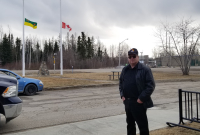Support strong Canadian climate journalism for 2025
Tammy Cook-Searson has been re-elected chief of the Lac La Ronge Indian Band in the band’s first online election.
“I’m just very relieved that we have not had any coronavirus in any of our communities and that we were able to successfully have an election. We need our leadership back,” Lac La Ronge Indian Band executive director Gladys Christiansen told National Observer after the results were tallied on Wednesday.
She said she is looking forward to the chief and council resuming their duties now that elections, which were postponed in March because of the pandemic, are done.
Cook-Searson had been in the middle of campaigning for a sixth term as chief when all that was put on hold due to COVID-19.
“They were monitoring the situation daily and at the end of the day, they felt that they could not continue with the election with the COVID-19 pandemic and to ensure the health and safety of the community members,” Cook-Searson told National Observer in March.

“There were people who were reluctant to proceed with an election and I’m glad that we’ve done it and that it’s finished,” Christiansen said.
Cook-Searson won the election with 1,346 votes, followed by Jude Ratt at 780 votes. According to official results, 3,418 band members, about 46 per cent of eligible voters, cast their ballots in the vote for chief and slightly over 1,700 participated online.
Cook-Searson was first elected chief in 2005. She was previously a councillor in La Ronge between 1997 and 2005 and ran as the federal Liberal candidate for the riding of Desnethé-Missinippi-Churchill River in 2019, but lost to Conservative Gary Vidal.
The Lac La Ronge Indian Band (LLRIB) is the largest First Nation in Saskatchewan with a population of about 11,000 and includes the communities of La Ronge, Sucker River, Stanley Mission, Grandmother’s Bay, Morin Lake and Little Red River.

Each community had a set of employees who looked after the election, processed and tallied votes. There were 75 election workers throughout the communities.
Christiansen said the online voting went well and the First Nation intends to continue with it in future elections. Going forward with online voting will require a change to LLRIB’s Election Act and approval by membership.
“It’s the first time we’ve done it that way and I think the next time it will be smoother. We will probably continue to do online voting in the future because it’s so much simpler and because of the changes with COVID-19,” Christiansen said.

She said that based on the number of people who participated online, which is around 48 per cent of voters, the endeavour was a success.
An election tribunal was appointed for the first time this year, too. Christiansen chaired the tribunal and she said this made a difference because more people were involved.
“It was one of the suggestions from membership during the last revision to the Election Act and that was followed through,” Christiansen said.
As well, she said that keeping the chief and council out of the election process improved confidence and participation among voters despite lower turn out due to the pandemic.
“There is more transparency when it’s an independent tribunal,” Christiansen said.
She said that there were representatives from each LLRIB community on the tribunal, as well as one from the urban centre of Prince Albert and one elder.
Michael Bramadat-Willcock/Local Journalism Initiative/Canada's National Observer








Comments